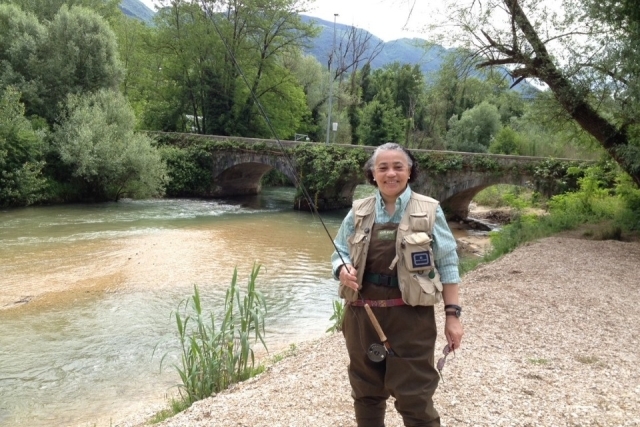
In November 1994, Janice Robinson packed her fly rod and reel and traveled to Drakensburg Mountain, South Africa, one of the world’s premier fly fishing locations. It was a transformative time. Just seven months earlier, anti-apartheid activist Nelson Mandela had become the country’s first democratically elected president.
“We stayed at a fishing camp owned by Afrikaners,” Robinson says of that memorable trip. “They weren't prepared to host a Black American, and a woman no less. But soon enough we were connecting over the day’s catch and swapping fish stories at dinner.” All these years later, Robinson’s experience in South Africa serves as a lasting reminder of why she loves to fly fish. “The streams have the power bring people together,” she shares.
Some 8,200 miles from South Africa lie the dense mountains, tranquil valleys, vibrant wildlife, and pristine rivers of the Catskill Mountains, where you can often find Robinson today. She has a small home in the region, which is considered the birthplace of American dry-fly fishing, an angling technique employing an artificial fly that floats on the surface of the water. “When I was a child, my father taught me to fish in the Long Island Sound,” Robinson recalls. “After graduating from St. John’s Law and starting my career as a Legal Aid attorney, I yearned for respite outside the city. Reading up on fly fishing, I taught myself how to cast, took some lessons, fell in love with the sport, and eventually earned a New York State lifetime fishing license.”
Robinson’s passion for fly fishing intertwines with her professional life, which has taken her from law practice to the field of higher education. She is now Vice President for Diversity and Community Affairs at Teachers College, Columbia University’s graduate school of education, health, and psychology. “The ability to concentrate, to listen carefully to others, and to genuinely be open to learning new skills—or sharpening old ones—is a constant with fly fishing,” Robinson explains. “I try to apply that in my professional life. I also strive to bring the patience that more experienced fly fishing mentors have with me to my work in the classroom as an Associate Professor of Higher Education.”
The connection between fly fishing and education is also evident in Robinson’s volunteer work with Theodore Gordon Flyfishers, a conservation and education organization where she serves on the board of directors and co-chairs the Education and Founders Fund scholarship committees. The scholarships provide support for graduate-level or law students whose studies include ecology, conservation, or environmental law or policy. “Like the sport it represents, Theodore Gordon Flyfishers immerses its members in conservation,” says Robinson, who uses catch-and-release practices that leave fish unharmed. “Conservation and fly fishing keeps the streams clean for people and for the fish. It also provides a better understanding of the science of the flies and the movement of the water in the streams.”
As Robinson continues to inspire future teachers and fly fishers alike, she reflects on lessons she learned in South Africa decades ago. “Fly fishing has given me the ability to meet many different kinds of people from different backgrounds, who all share wonderful experiences and stories,” she says. “While the world constantly changes around us, we come together and forge enduring connections through a sport we love. It’s incredibly gratifying.”
